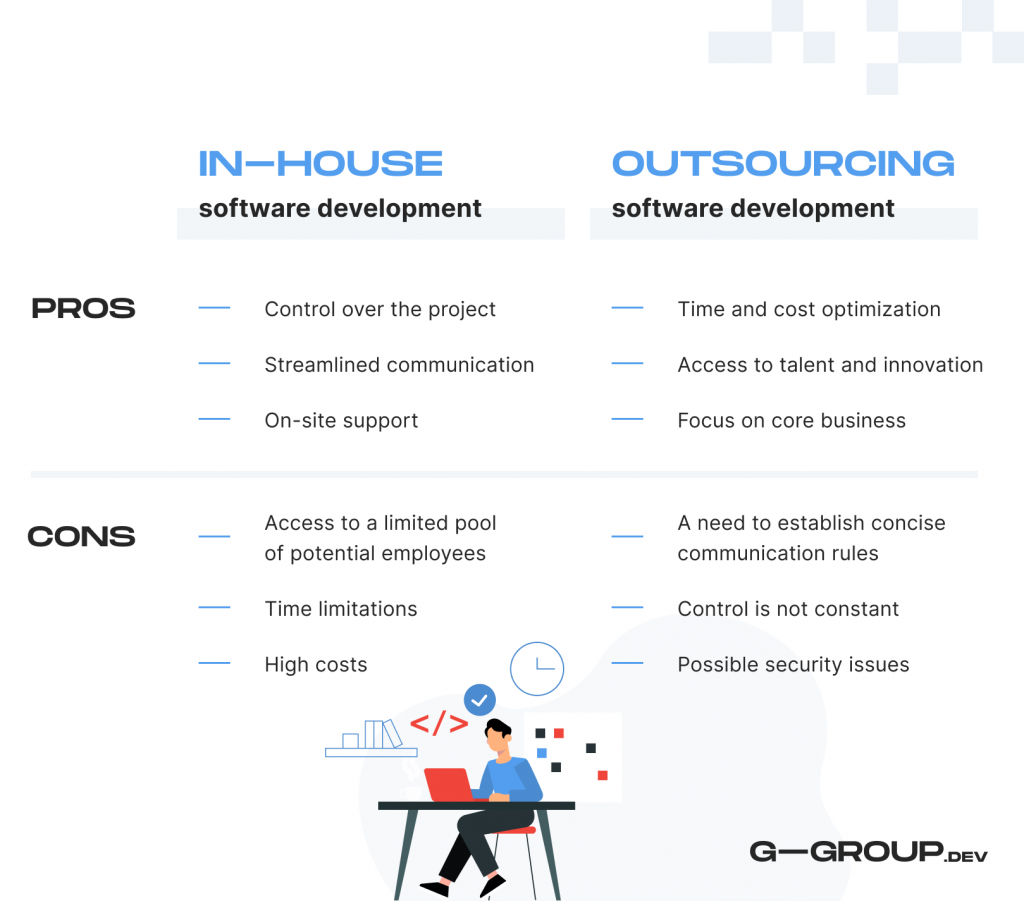Software development outsourcing is a common practice among businesses today. It’s a prominent option with a lot of advantages. However, many companies are still not sure if they should go for it or rather invest in an in-house team. We believe that every business owner should make a decision based on their specific needs. Still, we can prove that outsourcing is almost always the best choice. We’ve dedicated this article to doing so. Read on to find out who wins in the battle: outsourcing vs. in-house development.
Outsourcing vs. in-house development – intro
Before we begin, we should provide some definitions. Software outsourcing is a business model based on contracting with a third-party company. Its task is to provide various services related to creating IT products. From coding to quality assurance, project management, and UX/UI design – everything is handled externally. Software houses are usually hired by companies that want to build digital products but have various reasons to not recruit an internal team of programmers and other specialists.
As you can probably tell, in-house development is the opposite model. It means building a dedicated internal department that will take care of all IT-related needs. It’s the perfect choice for enterprises that develop apps, websites, and other products regularly and want their employees to work on them constantly.
Let’s see what both of these approaches offer and what are their biggest challenges.
The benefits and drawbacks of in-house development
Here’s a list of pros and cons when it comes to in-house software development.
Pro: Complete control
The most obvious benefit of in-house development is that it provides bigger control over the end product. You can make it exactly how you want it. You don’t have to worry about someone doing things differently than you imagined. Although seasoned software houses listen to their clients and always look for compromises if there’s a problem, some decision-makers like to be fully in charge.
However, building an in-house team means that you have to pay for all the resources. Therefore, you put a major chunk of your budget towards finding the right employees. In addition, you will be responsible for managing them and making sure that they are working as efficiently as possible.
Pro: Easier communication
If you have your team working for you on-premises, you can get in touch with them whenever it’s necessary. They work the same hours as you. This means they are available for a quick problem-solving session or discussion about the current state of the project. Not to mention the lack of a language barrier and adjustment to the company’s culture.
What you should remember here is that IT specialists prefer to work remotely. It might be challenging to build an entire team that will sit at the office every day. This means that you will still have to exchange emails and schedule calls. It will be exactly the same as working with an outsourced team.
Pro: Immediate reaction in case of emergency
There are no time zone differences when working with a local, internal team of developers. Thus, reacting to potential technical malfunctions is faster. Help is available whenever it’s needed which is crucial to delivering an exquisite customer experience.
Of course, when working with an outsourcing company, you can sign an SLA that will have specific rules for after-implementation support. Preparing the right guidelines allows you and your external team to minimize the risk of delayed reactions to difficulties.
Con: Limited pool of talent
It’s not easy to build an internal team nowadays. The demand for software developers is enormous and there’s a lack of specialists on the market. It could take you weeks or even months to hire every employee you need to deliver the product you desire. Moreover, if the project scope evolves during production, you will have to look for more professionals or invest in training for the existing ones.
Con: Time constraints
If you don’t have enough people on board, or they don’t have the required skills and experience, working on the project might be highly inefficient. As mentioned, changing your team’s composition to meet evolving requirements can take a lot of time.
Think about that. In-house development takes longer than outsourcing because you’re limited by how many people can work at once instead of by how many hours they can work per day.
Con: It’s expensive
Unless you don’t want to develop multiple software products in the upcoming few years, it’s always cheaper to outsource your IT needs. The cost of recruiting, onboarding, and maintaining employees is definitely higher. That’s because you need proper management staff, testers, graphic designers, and programmers with various competencies. After your app or website is finished, you need to give them something else to do. Otherwise, it will be inviable to keep them.
Research doesn’t lie: the cost of hiring an in-house developer can go up to 12% of their salary. It’s also extremely time-consuming, and we all know that time is money. It’s much cheaper and faster to find a suitable software house and outsource your project to them. Now, we will explain how’s that possible.

The pros and cons of software development outsourcing
Now let’s focus on outsourcing with its advantages and drawbacks.
Pro: Time and cost optimization
By outsourcing, you can avoid the hassle and expense of hiring and training in-house developers. That’s just the beginning of saving money and your precious time. You get a team of experts that are familiar with various software projects and know how to deliver quality results on estimated deadlines. You don’t have to worry about HR bureaucracy and operational costs because that’s on the software house’s side.
The most significant benefit here is that outsourcing allows you to collaborate with a provider from a different country. It often means they don’t charge as much as your local IT companies. Their salaries and living costs are lower even though they have broad expertise and excellent skills. Taking advantage of that can save a huge chunk of your budget.
Cost optimization is the main reason to outsource software needs according to research. 70% of recipients claimed that’s why they turn to external IT partners.
Pro: Access to talent and innovation
When you outsource software development, you can tap into a pool of highly skilled developers who are experts in their fields. These specialists have years of experience, and they know what works and what doesn’t. You can count on their advice and efforts to build the best solution that will meet your business goals. Whatever your software needs are, you can choose from global companies that have adequate professionals on board.
Software houses invest a lot in their staff because their goal is to have a versatile offer that meets the needs of as many clients as possible. That’s why you don’t have to worry if your project has unusual requirements. Find a partner that outsources programmers with knowledge of various languages and frameworks. Then you will be able to create a product with all the features you need.
Pro: The possibility to focus on your core business
Outsourcing also allows you to take care of other business-related matters while the development team works on your project. You don’t have to manage or control them at all times. Usually, you need to be present during crucial meetings to discuss the next steps, potential difficulties, and proposed changes. Then, you let your partner do what they do best, while you get back to your usual daily routine.
The main advantage of such a collaboration is that many things happen at once. You don’t have to neglect other parts of your business just to make sure the software is being produced. Everything established within a contract with a software house has to be delivered on agreed upon time. You will be informed about delays, problems, and changes that need your decision. There’s more flexibility, that’s for sure.
Con: Possible communication issues
If you’re not cautious while picking the provider, you might stumble upon communication problems. They are caused not only by language differences. Most software houses hire developers and other employees that have great English skills. Other possible problems involve cultural misunderstandings or a lack of clear and concise guidelines when it comes to discussing the project.
That’s why it’s so important to research your potential IT partner and talk to them before you decide to outsource. You need to know that there’s a good vibe between all involved parties. The team you will work with should be able to explain every part of the process and all potential risks with ease.
Con: No strict control
Outsourcing is not for control freaks. If you want to look over every single task and keep track of every code line, you should rather look for an in-house team. However, even if you hire internally, your employees will probably feel micromanaged. Finding balance when it comes to controlling the team is crucial for positive cooperation. It’s also essential for productivity. Constantly changing something or proposing different solutions means your outsourced team won’t be able to deliver.
If you’re able to trust your partner, it’s the first step to a successful project. They will do everything to meet your expectations and definitely tell you about challenges. If you let go, the effects might surprise you.
Con: Security and trust
Speaking of trust, we know that working with an outsourcing company requires a lot of it. Especially when it comes to sensitive, confidential data that has to be shared. Many software houses invest in high-quality safety measures to make sure that their client’s information is properly guided. Your goal is to find such a partner. Then you should include everything that you’re worried about in the contract with adequate policies that will guarantee that the collaboration won’t lead to negative consequences.
A transparent provider will inform you about their privacy policy, data management, and other practices that ensure security. For example, you can sign an NDA if you don’t want them to disclose the name of your brand or other information. If you can see that a software house of your choice is dedicated to providing secure services, you can be sure they won’t jeopardize their reputation to leak or lose your data.
Comparison table – outsourcing vs. in-house development

Conclusion
As you can see, each option has its pros and cons. In-house development can be great for enterprises that have budgets and want to control the whole process from day one. Outsourcing is an option for growing businesses, startups, and big corporations alike. If your organization’s main goal is to create a software solution, scale it up, and optimize the costs of production, you should definitely pick it.
We always recommend outsourcing because its advantages are essentially more significant than its drawbacks. Most of the potential problems can be solved with the choice of the right provider and an appropriate collaboration framework. The results are often spectacular thanks to the broad expertise of the outsourced teams. Nevertheless, always make these decisions based on your brand’s requirements.
Are you convinced? Or maybe you have some questions? Reach out to us and let us know what are your software needs. We will take care of them and show you how working with an external provider can be the right step in your company’s digitization journey.